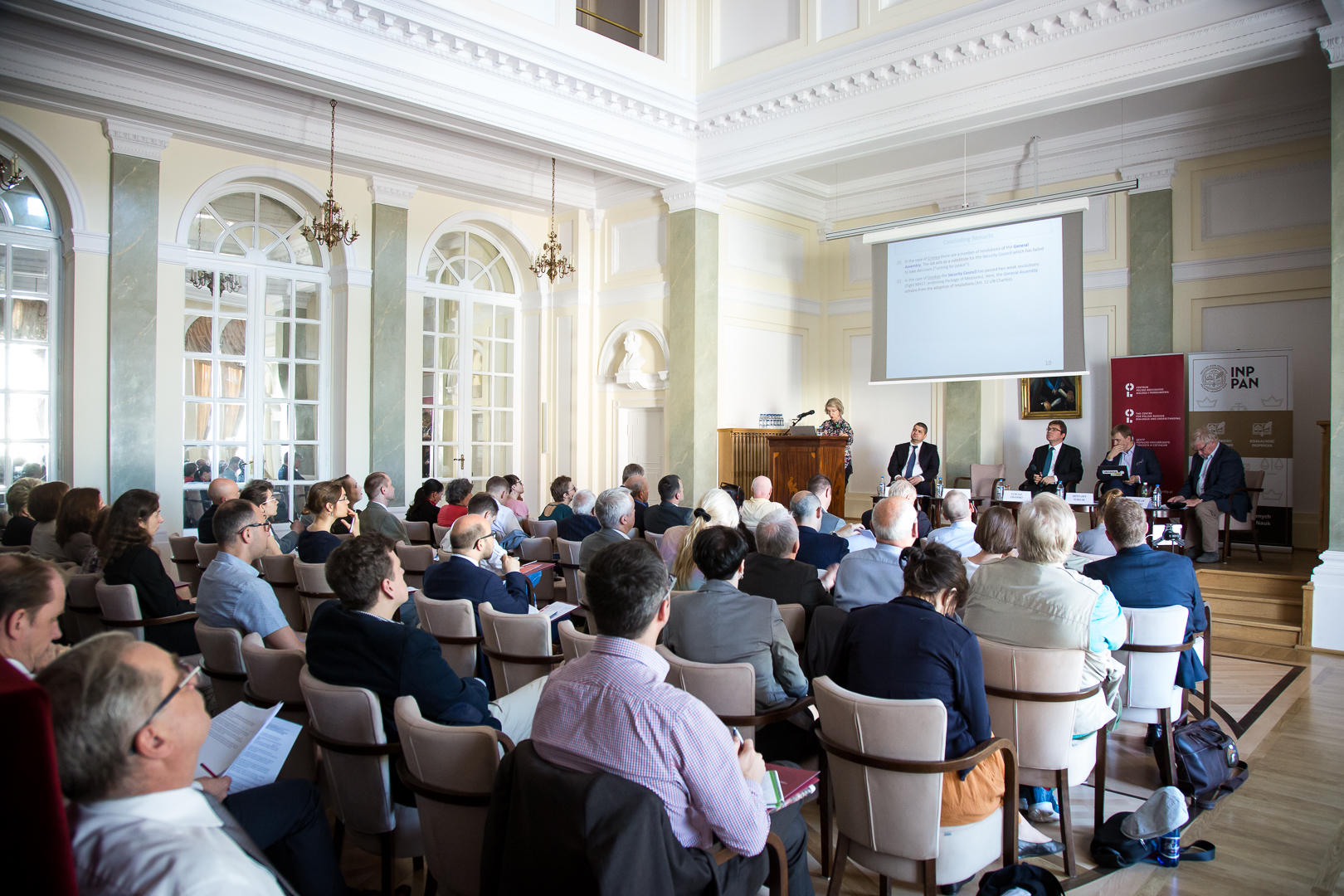Russia and Ukraine: Challenges for International Law and Politics
Centrum Polsko-Rosyjskiego Dialogu i Porozumienie we współpracy z Instytutem Nauk Prawnych PAN i Centrum Europejskim UW zorganizowało międzynarodową konferencję naukową pt. Russia and Ukraine: Challenges for International Law and Politics. W obradach udział wzięli politolodzy i prawnicy z Rosji, Ukrainy i innych europejskich państw.
W pięć lat po aneksji Krymu relacji rosyjsko-ukraińskie wciąż są bardzo niestabilne co implikuje wiele problemów na arenie międzynarodowej. Zaogniona sytuacja na wschodzie Ukrainy i incydenty na Morzu Azowskim czynią konflikt rosyjsko-ukraińskim jednym z najważniejszych wyzwań dla międzynarodowej polityki i prawa międzynarodowego. Pierwszy panel konferencji poświęcony był analizie obecnej sytuacji z punktu widzenia właśnie prawa międzynarodowego. Eksperci starali się przedstawić możliwe scenariusze wyjścia z impasu. W drugiej sesji przeanalizowane zostały możliwości jakie mają międzynarodowe instytucje aby pomóc w stabilizacji sytuacji na miejscu. Ostatni panel został poświęcony perspektywie politycznej. możliwe z punktu widzenia prawa międzynarodowego scenariusze zostały zweryfikowane z puntu widzenia interesów poszczególnych graczy.
Inspiracją do dyskusji była książka The Case of Crimea's Annexation under International Law, wydana przez CPRDiP i Wydawnictwo Naukowe Scholar.
Zapraszamy do zapoznania się z programem konferencji:
10:00-10:10 Opening:
- Ernest Wyciszkiewicz (Centre for Polish-Russian Dialogue and Understanding, Warsaw)
- Bogdan Góralczyk (Centre of Europe of Warsaw University)
- Władysław Czapliński (Institute of Law Studies of the Polish Academy of Sciences, Warsaw)
10:10-11:40 Session 1: Crimea and Donbas under legal scrutiny - where are we and where can we go from here?
Moderator: Łukasz Adamski (Centre for Polish-Russian Dialogue and Understanding, Warsaw)
- Dagmar Richter (Saarland University, Saarbrücken) – U.N. Resolutions and Declarations Relating to the Donbas Region
- Władysław Czapliński (Institute of Law Studies of the Polish Academy of Sciences, Warsaw) – Emerging and Unrecognized Entities in International Law
- Nikolay Marin (South-West University “Neofit Rilski”, Blagoevgrad) – How to regulate the situation of Crimea (from the point of view of international law), probable and less probable scenarios, taking into account the jurisdiction of adequate international courts and tribunals
- Hennadiy Maksak (Foreign Policy Council “Ukrainian Prism”, Kyiv) – Political and legal peculiarities of the current situation in Crimea and Donbas, likely and unlikely scenarios of developments between Russia and Ukraine
11:40-12:00 coffee break
12:00-13:30 Session 2: Norm-makers, norm-setters, norm-enforcers? Real and imagined capabilities of international institutions
Moderator: Agnieszka Bieńczyk-Missala (Warsaw University)
- Salvatore Zappalà (University of Catania) – What can be done in the case of the Ukrainian-Russian conflict on the UN level?
- Jochen von Bernstorff (Tübingen Law Faculty) – The erosion of the prohibition of the use of force in international law: From Crimea to Yemen
- Andrzej Szeptycki (Warsaw University) – The future of Ukraine-Russia relations from the perspective of EU actors
13:30-14:15 lunch
14:15-15:45 Session 3: A political reality check – who is ready, willing and able to do what, when and under what conditions?
Having in mind possible legal solutions as given during the proceeding, which of them are or can be politically feasible under what conditions now or in the future given different domestic contexts and foreign policy agendas of each stakeholder (Russia, Ukraine, Poland, NATO, EU).
Moderator: Ernest Wyciszkiewicz (Centre for Polish-Russian Dialogue and Understanding, Warsaw)
- Andrey Zagorskiy (Primakov Institute of Word Economy and International Relations (IMEMO) of the Russian Academy of Sciences, Moscow)
- Olena Snihyr (Diplomatic Academy of Ukraine at the Ministry of Foreign Affairs of Ukraine, Kyiv)
- Łukasz Kulesa (Polish Institute of International Affairs, Warsaw)
15:45-16:00 Final remarks
